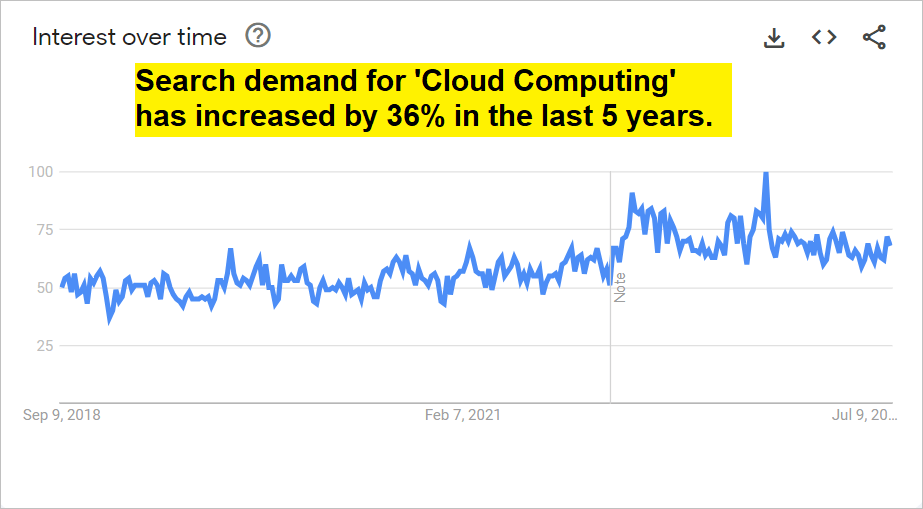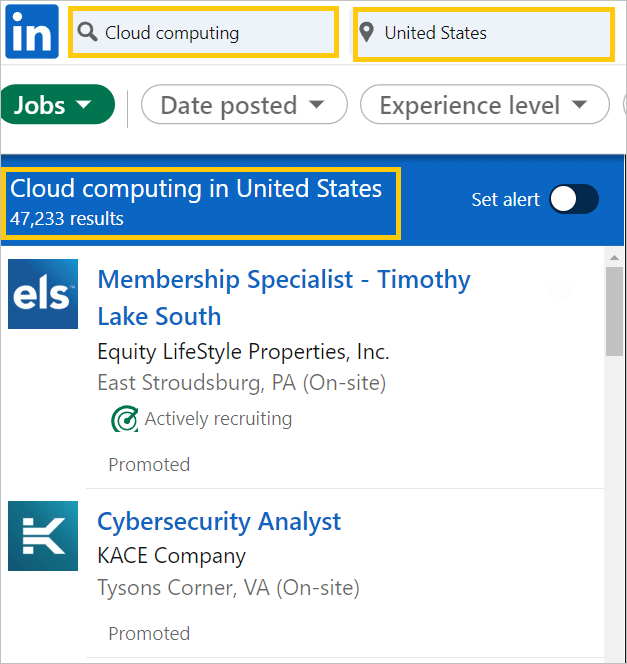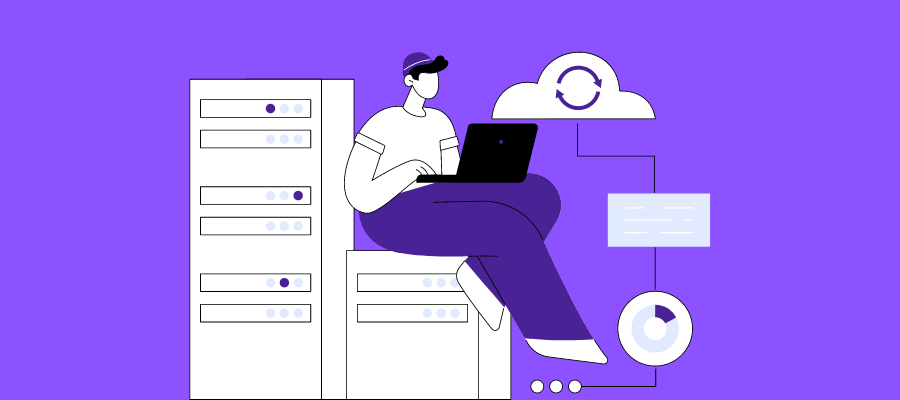If you’re looking to identify career opportunities, job demands, and cloud computing career path in 2023, this guide will answer all of your questions.
Table of Contents
Is Cloud Computing a good career path in 2023?
Yes, cloud computing is a good career choice in 2023 because the demand for cloud computing professionals and technologies has been steadily increasing. In fact, the search demand for cloud computing has increased by 36% in the pas 5 years, according to Google Trends.

As 5G networks expand, cloud services will become even more accessible and integral to IoT and mobile applications. Regarding the job opportunities in US and India, cloud computing offers 40k+ cloud computing job roles only in LinkedIn— this shows the career potential of skilled cloud computing professionals in the future. In fact, LinkedIn’s job report states that the job growth of cloud engineers will be around 27%.
So, if you’re planning to start your career, cloud computing is one of the reliable and high paying career option in 2023.
What is Cloud Computing?
Cloud computing involves providing computing services, such as servers, storage, databases, networking, software maintenance, analytics, and intelligence, over the internet (commonly known as ‘The Cloud’). It provides faster services, promotes innovation, offers flexible resources, and scales economically.
For instance, consider managing an organization’s data storage in the cloud instead of relying on physical hardware like hard disks. This approach ensures data accessibility from anywhere in the world, overcoming the distance limitations imposed by traditional hardware.
What do Cloud Engineers do?
Cloud engineers are IT professionals entrusted with managing and orchestrating all cloud-related activities. They specialize in cloud technologies, focusing on tasks such as developing cloud-based applications and overseeing data storage and monitoring for various companies using cloud services.
Day-to-Day Tasks:
- Developing and maintaining cloud infrastructure.
- Ensuring robust data security for companies using cloud platforms, with a focus on cloud security.
- Managing and expanding cloud storage capacity to accommodate growing corporate data needs.
- Troubleshooting and documenting technical issues, including cloud application problems, infrastructure failures, and security vulnerabilities.
- Creating and implementing cloud computing solutions tailored to client or customer requirements.
- Researching and evaluating the best cloud solutions in collaboration with engineering and development teams.
- Providing training to the IT team on the use of various cloud computing technologies.
Cloud Computing Career Paths in 2023
1. Cloud Support Engineer
Cloud Support Engineers specialize in troubleshooting cloud-related issues and providing expert technical assistance and solutions to clients, customers, and B2B clients using cloud-based services and applications.
Years of experience required: 0-2 years.
Role Type: Entry Level or Fresher
Average Annual Salary: ₹5 lakhs in India, $87,109 in the US
Job Responsibilities:
- Offering technical assistance and support to clients experiencing issues with cloud-based services and technologies.
- Collaborating closely with clients to resolve their specific cloud-related challenges.
- Assisting clients in selecting the most suitable cloud services from providers.
- Developing technical plans for implementing cloud activities in client applications and systems.
- Validating, verifying, and documenting product deployments in the service.
- Debugging and troubleshooting faults and issues in cloud-based applications.
Key Skills Required:
- Knowledge of at least any programming language, including Python, Ruby, Java, etc., Program writing, debugging, and helping in software configuration under the direction of senior engineers.
- Have a clear understanding of Networking concepts, different knowledge of cloud platforms, etc.
- A strong understanding of cloud-based products/services and technologies allows them to troubleshoot client-side issues and provide accurate solutions.
- Have good communication skills to Interact with clients and guide and provide a helpful and respective solution to their client.
2. Cloud Administrator
Cloud administrators are specialists in overseeing and upkeeping cloud-based systems and an organization’s overall infrastructure.
Years of experience required: 2-3 years.
Role Type: Mid-level system administrator or IT support engineer
Average Annual Salary: ₹6 lakhs in India, $74,956 in the US
Job Responsibilities:
- Managing and overseeing the company’s cloud infrastructure and functionalities.
- Handling the day-to-day cloud operations, particularly related to cloud-based applications.
- Deploying cloud-based services and their associated infrastructure.
- Managing the lifecycle of cloud-related applications, including creation, updates, activation, deactivation, and deletion.
- Administering access permissions for various groups, users, clients, and employees.
- Troubleshooting cloud-based activities.
- Diagnosing and resolving faults and issues in cloud-based applications with the IT team.
- Ensuring compliance with company policies and protocols in the cloud environment.
Key Skills Required:
- Knowledge of any scripting language like Python, Bash, etc.
- Understanding and knowledge of Cloud Platforms, Networking, OS, etc.
- Familiar with cloud security practices to implement the security measured in cloud services.
- Understanding of technologies of cloud computing, including ISaas, Psaas, etc.
- Knowledge of troubleshooting problems in coordination with the IT team.
3. Cloud Architect
A Cloud Architect, also known as a Cloud Solutions Architect, plays an important role in designing and implementing cloud computing solutions and strategies for organizations.
They evaluate and choose the cloud services and platforms such as AWS, Azure, Google Cloud that best suit the organization’s requirements and budget.
Years of experience required: 4-5 years
Role Type: Intermediate-level Cloud solution architect who knows different cloud platforms
Average Annual Salary: ₹22 lakhs in India, $158,919 in the US
Job Responsibilities:
- Creating, designing, and maintaining complex cloud computing solutions.
- Focusing primarily on design and vision, rather than implementation.
- Selecting appropriate technologies, frameworks, and design practices.
- Ensuring a seamless transition to cloud operations within the organization.
- Meeting with clients to comprehend their needs, designing solutions that align with their requirements, and achieving their goals.
Key Skills Required:
- Creating and executing different cloud solutions, collaborating with clients
- Contributing to architecture determinations to meet business-specific needs
- Knowledge of Cloud computing Technologies and cloud solutions
- Understanding of architecture and different design principles
- Networking, Databases, and security
4. Cloud Developer
Cloud developers work with technologies like AWS, Azure, and Google Cloud to design and maintain cloud-based applications and administrations for their clients.
Years of experience required: 2-3 years.
Role Type: Mid-Level Cloud Developer
Average Annual Salary: ₹8.5 lakhs in India, $121,948 in the US
Job Responsibilities:
- Creating, designing, implementing, and executing cloud-based applications and services.
- Developing efficient, scalable, and functional applications compatible with various cloud platforms, infrastructures, and frameworks.
- Operating within diverse cloud environments and infrastructures.
- Proficiency with multiple programming languages, systems, and frameworks, including Python, Java, and .NET Framework, for developing cloud-based services and applications.
Key Skills Required:
- Automating designing, development, and implementing.
- Knowledge of various programming languages such as .NET framework, Java, etc.
- Having Knowledge of different APIs, development tools, and databases.
- Knowledge of Emerging Cloud computing Technologies, different cloud-based platforms, and multiple cloud provider environments.
5. Cloud Security Engineer
Cloud Security Engineers are responsible for ensuring the security of cloud infrastructure, cloud-based applications, and all cloud-based services.
Years of experience required: 3-5 years.
Role Type: Mid-Level Engineer
Average Annual Salary: ₹8.5 lakhs in India, $1,21,176 in the US
Job Responsibilities:
- Identifying and mitigating various security risks and threats to cloud-based applications, services, and infrastructure.
- Monitoring security events and potential threats in cloud-based environments.
- Ensuring data protection within cloud systems.
- Planning, creating, implementing, and testing security updates, including firewall and encryption measures.
- Providing customer support in the event of a security breach.
- Responding to and addressing issues to prevent significant data leaks and breaches.
Key Skills Required:
- Should have knowledge of the main operating systems.
- Proficiency with programming languages such as Python, Golang, Java, and ASP.NET.
- Knowledge of different cloud platforms and their compliance regulations.
- Knowledge of ethical hacking and experience in information security.
6. Cloud DevOps Engineer
A Cloud DevOps Engineer is responsible for creating and handling the deployment of all software applications used in a cloud environment and its infrastructure.
Years of experience required: 3-5 years.
Role Type: Mid-level Engineer
Average Annual Salary: ₹7 lakhs in India, $103,002 in the US
Job Responsibilities:
- Ensuring the smooth and efficient operation of cloud-based applications.
- Managing and overseeing the progress of cloud infrastructure and frameworks.
- Collaborating with other developers to integrate cloud-based solutions across various platforms.
- Coordinating with research and development teams to identify opportunities for enhancing automated cloud solutions.
- Monitoring client feedback and responding accordingly.
Key Skills Required:
- Have a good understanding of the cloud infrastructure.
- Prior knowledge of Testing and automation.
- Proficiency in programming languages like Java and Python
- Knowledge of Continuous integration and continuous deployment.
- Proficiency in at least one scripting language like Perl, Tcl, Python, etc.
7. Cloud Network Engineer
Cloud Network Engineers are tasked with creating, developing, managing, and configuring cloud-based networks. They work closely with cloud providers to establish resources, configure network devices, and resolve network-related issues.
Years of experience required: 3-5 years.
Role Type: Mid-Level Engineer
Average Annual Salary: ₹8.3 lakhs in India, $91,201 in the US
Job Responsibilities:
- Coordination with IT teams to ensure cloud-based networks are secure and safe
- Creating and configuring cloud-based networks within the cloud environment.
- Responsible for setting up networking devices, including routers and switches.
- Managing cloud-based networking troubleshooting and investigating network issues.
- Handling and managing cloud-based network performance and security monitoring.
Key Skills Required:
- Understanding of cloud computing technologies and should also have an understanding of networking concepts
- Strong foundation in cloud infrastructure such as IaaS, PaaS, and Saas.
8. Cloud Data Scientist
Cloud Data Scientists, also referred to as Cloud Data Engineers, are responsible for managing raw data, performing data analysis, and structuring data to enable intelligent and actionable decision-making.
Years of experience required: 3-5 years.
Role Type: Mid-Level Engineer
Average Annual Salary: ₹7.4 lakhs in India, $124,660 in the US
Job Responsibilities:
- Creating, designing, coding, and testing various cloud-based applications and services.
- Researching, identifying, building, and preparing data needed for modern BI solutions.
- Developing and documenting test cases to meet client requirements.
- Planning, architecting, monitoring, and managing the organization’s cloud-based data systems.
- Implementing and investigating cloud-based services to support cloud-based applications and maintaining cloud-based services.
Key Skills Required:
- One Should have a strong understanding of cloud computing technologies.
- Proficiency in different programming languages like SQL and Python.
- Understanding Data warehousing and Data Architecture means handling, building, and developing the database system.
- Knowledge of machine learning.
Job Outlook for Cloud Computing
The cloud computing field offers a wide range of career opportunities— most of them are already mentioned in this cloud computing career path guide.
As companies increasingly adopt cloud technologies, the demand for skilled professionals in this field has surged.
Let’s dive into the job market for cloud computing specialists in India and US:
The current job market in the US alone features more than 47,000 open positions on LinkedIn. Similarly, India’s job market boasts over 40,000 open positions on LinkedIn, highlighting the robust demand for qualified professionals in this tech field.

The number of cloud computing jobs is projected to increase by 15.4% from now to 2031 in the US, according to bls.gov.
In India, cloud computing jobs are expected to increase by a CAGR of 23.4% before 2027, According to IDC.
The US is expected to see a $2,321 billion increase in cloud computing-related opportunities by 2032, while India is projected to witness a growth of approximately $17.8 billion by 2027.
Skills and prerequisites to become a cloud computing engineer
Here are the top skills required to become a top cloud computing engineer:
- Educational Foundation: Common entry points include degrees in software engineering, computer science, or related fields. Advanced degrees, such as a Master’s or Ph.D., may be required for specialized roles.
- Coding Languages: Proficiency in multiple programming languages is valuable. Mastery of at least one programming language (e.g., ASP.NET, SQL, Python, PHP) is essential.
- Problem-Solving: The ability to dissect complex issues into manageable elements and develop effective solutions is a core skill.
- Understanding of OS and Linux: Familiarity with operating system fundamentals and Linux proficiency can be beneficial for entering the cloud computing field.
- Networking and Protocols: A working understanding of internet operations and networking is vital for cloud roles. Focus on network management, virtual networks, and networking fundamentals to improve user responsiveness in cloud-based roles.
- DevOps Understanding: Familiarity with DevOps principles and tools is crucial. Hands-on experience with DevOps tools like Git, Jenkins, etc., is valuable, especially in a cloud environment.
- Hands-On Practical Implementation: Practice using cloud environments and their services, such as cloud monitoring, cloud server management, network management, and developing cloud-based applications.
- Database Proficiency: Proficiency in SQL and database management is crucial for data-centric cloud applications within a cloud environment.
- Cloud Familiarity: Understanding various cloud platforms is essential for contemporary software deployment.
- Personal Projects: Building and implementing cloud-based projects can demonstrate practical skills.
- Internships and Experience: Real-world exposure through internships, co-op programs, or freelancing provides valuable practical context.
- Certifications: While not mandatory, earning certifications in distinct cloud computing technologies can facilitate entry into the cloud computing career.
Find detailed guide: Top prerequisites to learn cloud computing
Here’s an useful tip I found on reddit on starting a cloud computing career:

The Future of Cloud Computing— Will AI replace cloud engineers?
As we all know, nowadays, everyone uses AI to do less work, and it has all the answers and solutions to every type of question. Using AI in the industry also increases productivity, but at the same time, it does not provide the correct answers to our questions.
Understand that AI is a creation of human minds, developed by coders who programmed AI systems like chatGPT, Bing, Google, and others. AI’s capabilities are limited by the data it is trained on and the algorithms it employs.
For example, if you search about Chandrayaan-3 or any latest news on chatGPT, it will respond by saying, “I didn’t know about this I am just an AI tool and I have only data feed till 2021”.

This highlights the current limitations of such AI tools.
Summary: Cloud engineering involves complex, variable, and dynamic tasks, including security and compliance management, communication, and adapting to evolving technology. While AI can assist with some aspects like monitoring and scaling, it’s more likely to augment cloud engineers rather than replace them.
Cloud computing salary in US and India
The average salary of cloud computing specialist in ₹5lakhs per annum in India, according to Glassdoor data.
- The average annual salary of cloud engineers is ₹5.2 Lakhs
- Entry-level engineers earn around ₹2.9 Lakhs yearly
- Mid-level engineers can make between ₹17,44,817 lakhs yearly
- Senior engineers can earn up to ₹11.7 Lakhs yearly.
The average annual salary of cloud computing specialist in $92,070 in US , according to Glassdoor data.
While in the USA, cloud computing engineers earn particularly higher wages.
- Entry-level engineers make around $114,175 annually
- Mid-level engineers can make between $141,045 per year
- Senior-level engineers with extensive experience can earn $158,567
Factors that affect the salary:
- Company size and reputation
- Occupation and in-demand skills
- Education level and certifications
- Industry sector and cloud computing market demand
- Proficiency in various cloud technologies and tools
- Practical experience through internships, hackathons, projects, and hands-on experience.
- Developing a strong skill set for success in the cloud computing career.
- Job responsibilities, leadership roles, and managerial positions.
- Proficiency in cloud-related technologies and programming languages like Python, SQL, etc.
- Performance, achievements, and contributions.
- Negotiation skills during hiring and performance reviews.
How Difficult is Cloud Computing?
Cloud computing is a complex field with inbuilt complexity, making it challenging to understand and learn.
Hands-on experience with different cloud models and platform-level use can be challenging, but it becomes easier with constant practice and learning.
Cloud computing can be technically challenging as you need to master many technical areas such as:
- You must understand encryption, identity management, access control, and compliance standards (e.g., GDPR, HIPAA).
- You should have proficiency in infrastructure as code (IaC) tools like Terraform or AWS CloudFormation and automation scripts (e.g., using Python)
- Cloud service providers (e.g., AWS, Azure, Google Cloud)
Initially, you might find cloud computing difficult and too technical as a beginner. However, once you learn the basic foundation of cloud platforms and infrastructure with hands-on experience, you can become a successful cloud computing engineer.
Is the cloud computing career path a right fit for you?
Take the following quiz to self assess whether cloud computing is the right career path for you or not.
Question 1: How comfortable are you with technology and computer systems?
- Not comfortable at all (1 points)
- Somewhat comfortable (2 points)
- Very comfortable (3 points)
Question 2: Do you have experience with programming or scripting languages like Python or JavaScript?
- No experience (1 points)
- Some basic experience (2 points)
- Proficient in one or more languages (3 points)
Question 3: How skilled are you at troubleshooting and solving technical issues?
- Not skilled (1 points)
- Moderately skilled (2 points)
- Highly skilled (3 points)
Question 4: Are you interested in computer networks and how data is transmitted over the internet?
- Not interested (1 points)
- Somewhat interested (2 points)
- Very interested (3 points)
Question 5: Are you adaptable and open to learning new technologies and tools constantly?
- Not very adaptable (1 points)
- Somewhat adaptable (3 points)
- Highly adaptable (3 points)
Question 6: How concerned are you about cybersecurity and protecting data in the cloud?
- Not concerned (1 points)
- Somewhat concerned (2 points)
- Very concerned (3 points)
Question 7: Do you enjoy collaborating with others and working in cross-functional teams?
- Prefer working alone (1 points)
- Enjoy some collaboration (2 points)
- Thrive in team environments (3 points)
Question 8: Are you willing to invest time and effort in obtaining cloud-related certifications (e.g., AWS Certified Solutions Architect, Google Cloud Professional Cloud Architect)?
- Not willing to pursue certifications (1 points)
- Open to pursuing certifications if necessary (2 points)
- Eager to obtain relevant certifications (3 points)
Question 9: How familiar are you with major cloud service providers like AWS, Azure, and Google Cloud?
- Not familiar with any (1 points)
- Familiar with one provider (2 points)
- Familiar with multiple providers (3 points)
Total Score:
- 9-15: Cloud computing may not be the ideal career choice for you at this time.
- 16-21: You have potential in cloud computing but may need to work on certain skills and interests.
- 22-27: You have a strong aptitude and interest in cloud computing, and it could be a great career path for you.
NOTE:
This process is not the most effective way to decide your career. However, you will get a quick understanding of your interests and current skills.
If you’re looking for a career alternative, you may consider the solution architect career path by reading this guide.
Further cloud computing resources:
- Best cloud computing courses in delhi
- Cloud computing seminar topics to choose
- Best books on cloud computing
Cloud Computing course certifications to start your career
Choose the right cloud computing courses in the following locations:
1. AWS(Amazon Web Services) Certification: This is a foundational-level certification for individuals looking to start their journey in AWS. This cloud computing certification program tests your understanding of AWS Cloud, services, and terminology. The exam lasts 90 minutes, contains 65 questions in multiple-choice or multiple-response format, and costs $100.
2. Microsoft Azure Fundamental Certification: This certification validates your foundational knowledge of cloud concepts and Azure services, enabling you to describe architectural components, security features, and administrative tools. The course materials are available at free of cost. However, the certification cost is $99 USD (varies by region).
3. Cloud Foundations by GreatLearning (Free): Explore cloud fundamentals, service delivery and deployment models, and pricing/scaling in this free course. Understand the cloud’s significance and evolution, service models, abstraction levels, and SPIDERS framework. Dive into cloud attributes, managed services, and deployment models. Master pricing models, scaling concepts in Google and AWS.
4. Google Cloud Platform Certification:
Google Cloud Certification covers a range of expertise levels, from foundational to professional, validating skills in cloud concepts, deployment, and advanced job functions. The best part is that you can start learn these courses for free.
Google offers a certification program for each of these areas:

Article by
Mouri Roy
Mouri Roy is a dedicated Software Developer and a fervent Technical Content Writer, currently in pursuit of her B-Tech in Computer Science and Engineering at Techno Main Salt Lake. Her expertise includes Java, ReactJs, NodeJs, ExpressJs, MongoDB, SQL, HTML, CSS, JavaScript, and Bootstrap, making her a versatile and sought-after developer.

